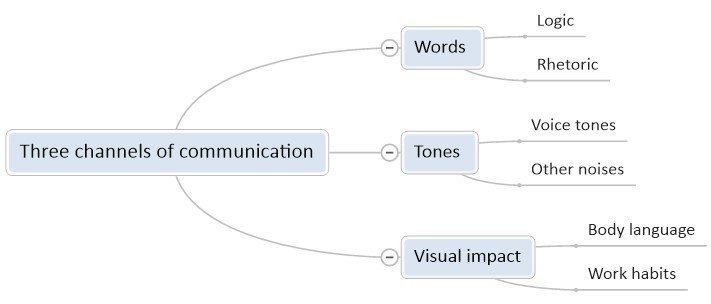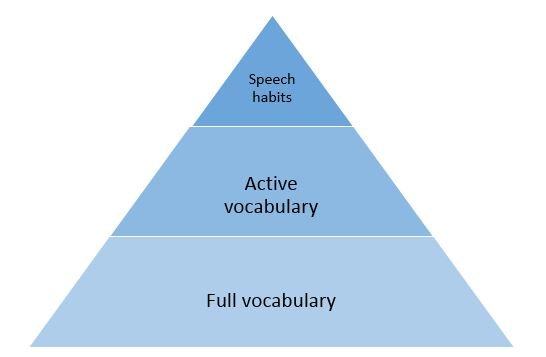Success Through Communication
Success Through Communication
Do you think, you would benefit if you were to develop your communication skills?
Since we all succeed by means of team work, communication is a vital skill to master.
Communication may be defined as: a transfer of information and/or emotion.
Communication as the transfer of information
These are the logical elements of your communication. The types of information you need to communicate are:
- Facts.
- Figures.
- Technical information.
- Proof that your ideas are right.
Communication is also the transfer of emotion. These are the emotional elements of your communication. The emotions you need to communicate are:
- Optimism.
- Friendliness.
- Enthusiasm.
- Fun.
In order to get the best from yourself and others work to improve your communication skills.
Communication Channels
There are three channels of communication:

1. Words:
Logic: facts, figures, information and proof.
Rhetoric: Enthusiasm, vision, motivation, positive emotion.
2. Tones:
Voice tones: Loud or quiet. Fast or slow.
3. Visual impact:
Body language: How you appear.
Work habits. How you act.
Score yourself out of ten for each of the following seven questions
1. How would you rate your ability to transfer facts, judgements and information FROM your mind to the minds of others, without any misunderstanding, omission or error? Do people always understand you, (Score higher); or are there frequent examples of other people not understanding what you mean to say? (Score lower).
2. How would you rate your ability to gain information from the minds of others? Do you ask the right questions, and do you listen well to the answers? Or are you sometimes not as attentive as you think you should be?
3. How would you rate your ability to handle words? To what degree would you say you have, The Gift of the Gab; or To what degree are you highly articulate?
4. What emotions do you think you inspire? Do you inspire positive emotions in the minds of others around you? Do you tend to inspire feelings of optimism, cooperation, and friendly good humour? or do you tend to depress or upset people? Are you annoying?
5. Are you able to handle conflict situations in a constructive positive way, or do you find conflict situations stressful, or difficult to handle well?
6. Generally, how would you rate your body language? Posture, gestures, expressions?
7. How would you rate your voice tones? Voice volume, pitch, accent, variability?
What did you score high on? What did you NOT score high on?
Is there anything you think you need to improve? If yes, then what?
Vocabulary
You have three layers of vocabulary.
- Full vocabulary. All the words you know.
- Active vocabulary. A smaller number of words that you actually use.
- Speech habits. An even smaller number of words you use often.

Speech habits
Speech habits are words or phrases that you use habitually, every day, without even thinking about them. Some people have some good speech habits. Which is splendid. Others have bad speech habits. Which is a bit crap.
Bad speech habits:
- Sort of thing. (I went down the park, sort of thing. I had a go on the swings, sort of thing).
- Is'n't 'alf. (I really like it. It isn't 'alf good.)
- Crap. ( I know you think it's all crap).
Have you got any bad speech habits? Think about it and name them here.
Good speech habits
Five polite phrases you need to incorporate in your good speech habits:
- Yes, please.
- No, thank you.
- Would you mind if we ....?
- Would you please ....?
- Thank you very much for X. I appreciate it.
In addition, show interest in anything that strikes you as worthy of honest praise.
People like praise. Give people what they want, and they will love you for it.
Definition: effective communication
In business, effective communication is the skill of sharing accurate facts and positive feeling through words, voice and actions that match, while checking that the listener understands. If your message lacks clear data, warm emotion, aligned channels or mutual feedback, it is no longer effective communication.
Show CG4D Definition
- Transfers accurate facts and figures without error
- Conveys constructive emotion that supports the message
- Aligns words, voice tone and body language
- Confirms mutual understanding through active feedback
Article Summary
Teams win when each person shares clear facts and warm feeling with good words, steady tone and open body language; build your communication skills, drop weak speech habits, and watch errors fall while trust and results rise.
Frequently Asked Questions
Here are some questions that frequently get asked about this topic during our training sessions.
What are the three main channels of communication?
How do I balance information and emotion in a message?
Why does voice tone affect how people react?
How can I spot and drop bad speech habits?
What does the self-assessment quiz measure?
How big should my active vocabulary be?
Why is body language so important in teamwork communication?
Thought of something that's not been answered?
Did You Know: Key Statistics
The 2024 State of Business Communication report found that 86% of workers say poor communication at work leads to failure. The 2022 State of Teams study showed that groups with clear daily communication are 3.5 times more likely to reach high performance.Blogs by Email
Do you want to receive an email whenever we post a new blog? The blogs contain article 5-10 minutes long - ideal for reading during your coffee break!
Further Reading in Communication - Clear Communication
-
Communication Skills: ABC Principle
Learn the ABC principle for effective communication: craft accurate, brief and clear messages that build trust, save time and prevent costly errors each day.
Read Article > -
Training to Improve Your Communication Skills
Learn nine simple steps to improve communication skills: clear speech, active listening, confident voice, smart body language and polite style. Build trust now.
Read Article > -
Advanced Communications Skills
Learn how precise word choice boosts communication skills, builds trust, and avoids costly mistakes. Use positive language to create images in every mind.
Read Article > -
Communication Skills: Two Opposites
Learn clear communication by spotting ambiguity and choosing contradictory, not contrary, opposites. Reduce polarised thinking and avoid misunderstandings.
Read Article > -
Ten Top Tips For Sending Professional Calendar Meeting Invites
Send a professional meeting invite that grabs attention: learn ten calendar invite tips to state the goal, share a plan, and boost attendance and results.
Read Article >
Looking for Communication Skills Training?
If you're looking to develop your Clear Communication Skills, you may find this Communication Skills Training Course beneficial:
Open Training Course Pricing and Availability
Next Open Course Starts in 5 days, Bristol (Clifton), places available







